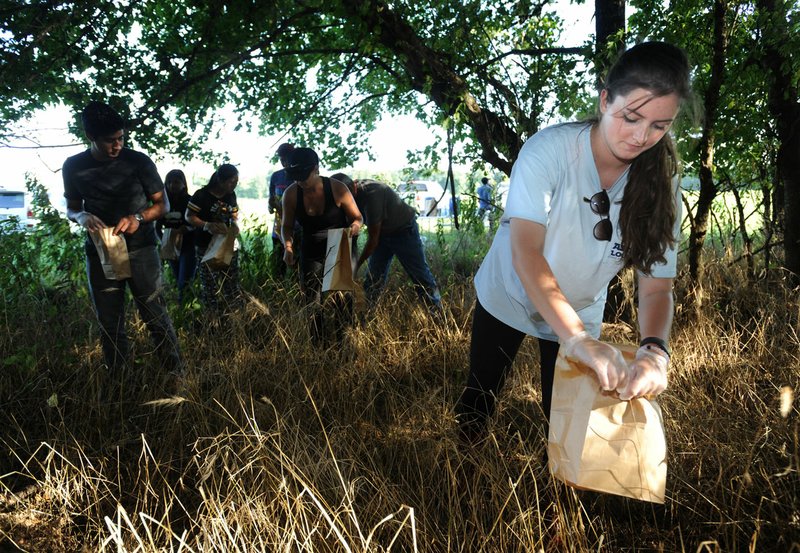FAYETTEVILLE -- Volunteers walked out of the woods and into a field carrying the brown paper bags they stuffed full of rye seeds. About 20 people managed to gather 25 pounds of native seeds to be spread on half of a mile along the White River.
The seeds could keep sediment out of the river and help preserve Beaver Lake water quality, said Jennifer Ogle, program coordinator for the Beaver Watershed Alliance. The lake provides drinking water for roughly 420,000 people in Northwest Arkansas.
The field
The Biosolids Management Site, formerly known as the Farm Site, or Land Application Site, is on 670 acres of midland bermuda fields. The operational facilities adjoins the Paul R. Noland Wastewater Treatment Facility property. The location is where the seed collection event was held Wednesday. For more information about the site, visit accessfayetteville.….
Source: City of Fayetteville
The alliance is dedicated to preserving, protecting and enhancing the water quality of the lake, according to the group's website, Ogle said.
"I think this is a good cause -- we are helping the earth really," said volunteer Michelle Escobar after handing over her seed collection. "Even if we're not a lot of people, we are making a lot of change and that's a good thing."
Escobar, of Panama, is a student at the Spring International Language Center connected to the University of Arkansas. She and about 13 other students volunteered to collect seeds. Students were from countries outside of the U.S. Two other university students not attending the center and about three residents also volunteered, Ogle said.
Marc Klein, of Fayetteville, is a resident who decided to take time to volunteer, he said. Klein normally would be hiking at Devil's Den State Park, he said, but came to collect seeds instead.
"Why not be outdoors and do something that will make the world a little bit of a better place?" Klein asked.
The seeds will be sown onto a nearby bank next month to try to stop sediment from eroding and running into the river feeding the lake. The seeds are more likely to survive because they are local and adapted to the environment, Ogle said. They also are what's best for the ecosystem because they will keep invasive plants from having taking root, she said.
That's especially important because the restoration area must first be re-sloped because erosion carved away the bank, said Aaron Thomason, watershed specialist with the Watershed Conservation Resource Center in Fayetteville. The conservation aims to provide "technical and planning services for the protection, conservation and restoration of watershed resources," according to the group's website.
Once the slope is reworked, the soil will be bare. It will be susceptible to invasive plants and could suffocate native saplings, which are vital to stabilizing the bank, Thomason said.
The alliance, center and CH2M Hill worked together with volunteers to hold the seed collection event Wednesday. Only about four or five seed collection events have been held so far, Thomason said. But, restoration work has been ongoing, he said.
The center maintains or is in the process of restoring roughly 10 sites -- similar for what is planned for the new site -- in Benton and Washington counties, Thomason said. Locations include the Illinois and Beaver watersheds, he said.
CH2M Hill operates Fayetteville's waste treatment facility on the eastern part of the city, near a bend in the White River where seeds were collected. The company also helps Fayetteville with "sustainable practices," according to its Website.
The field, where volunteers gathered after more than an hour finding and getting seeds, is tucked behind the Biosolids Management Site at 16464 Wyman Road. The native rye seeds only grow on plants in forests near rivers, Ogle said.
Ogle said the timing was perfect for gathering seeds.
"(The seeds) are barely holding on by a thread," she said. "They just pop right off."
"It's like if you take the meat from the kebab," said Eizhar Anwaer, a volunteer from China.
Anwaer said he volunteered before but never before to gather seeds. The experience was new and let him see the Northwest Arkansas landscape, he said.
On Wednesday afternoon, the sun cast a warm, yellow over the field. A family of deer wandered out of the woods and stood in the field watching the people. Flowers bloomed nearby. Cane grew nearby where Thomason said the restoration work would soon start.
"I just want to experience Arkansas," Anwaer said. "I find out it's beautiful here."
NW News on 09/08/2016

